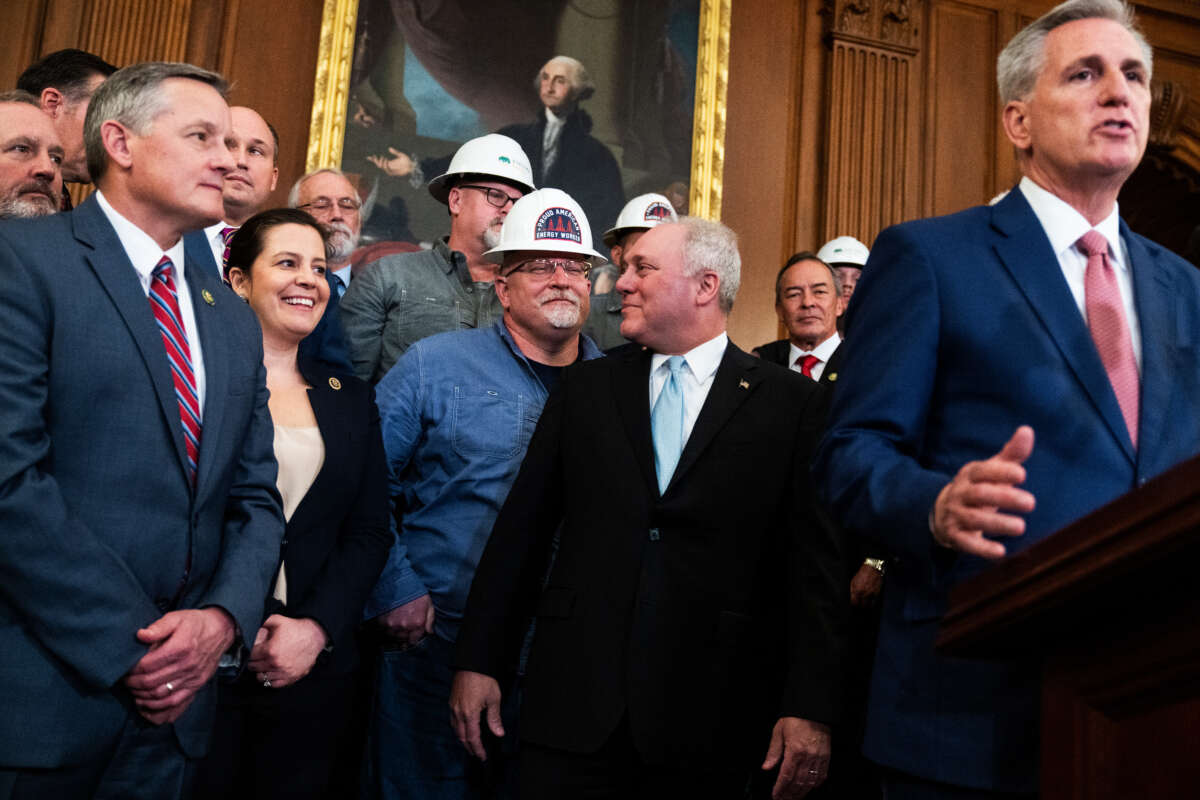On Tuesday, Republicans voted to pass legislation that would prohibit the Consumer Product Safety Commission from banning gas stoves — a proposal that was never quite on the table for the Biden administration, but that became a major moment in Republicans’ culture war nonetheless.
The legislation, which passed with all Republicans and 29 Democrats voting “yes,” is largely symbolic. The Senate is not likely to take up the legislation, and the Biden administration has signaled opposition to the proposal. But it is nonetheless a show of the GOP’s priorities on climate — or, rather, Republicans’ priorities on bolstering the fossil fuel industry — which have been heavily on display during the party’s control over the House in the past six months.
In fact, boosting fossil fuels seems to be the House GOP’s top priority, as party leaders have been shoving pro-fossil fuel provisions into nearly every major move — from the debt ceiling to their latest tax proposal — taken by the Republican-controlled House so far.
The gas stove legislation was the product of months of manufactured outrage by Republicans over the past months. Republican leaders were so adamant about passing the legislation to grandstand over the issue that they brought it to a vote again this week after similar legislation failed to pass last week after a revolt from far right hardliners upset over the debt ceiling deal, humiliating House Speaker Kevin McCarthy (R-California).
That there is a mountain of research showing that gas stoves generate vast amounts of harmful indoor air pollution and are estimated to be responsible for a large portion of childhood asthma cases, or the collective climate impacts of millions of stoves across the country burning fossil fuel, never seemed germane to Republicans throughout their efforts to push the legislation.
Big Oil favors were front and center in Republicans’ maneuvering on the debt ceiling, arguably the most significant legislation passed in this session of Congress so far. Republicans had tried to stuff the debt ceiling deal, struck between McCarthy and President Joe Biden, chock full of favors for the fossil fuel industry; nearly 90 percent of their original debt ceiling proposal was dedicated to fossil fuel “giveaways,” as Democrats pointed out.
The debt ceiling proposal specifically took aim at repealing a large portion of the climate provisions in the Inflation Reduction Act (IRA), Biden’s marquee compromise climate bill, as well as weakening the National Environmental Policy Act (NEPA), the nation’s oldest environmental law and a crucial tool in climate advocates’ fight for mitigating the climate crisis and promoting environmental justice. Though the IRA remained untouched in the final deal, the package ultimately included cuts to NEPA and a provision to fast-track the fracked-gas Mountain Valley Pipeline.
Just a week after that win, Republicans moved to take another bite out of what little climate action the federal government has taken — this time moving to repeal $216 billion of clean energy tax credits in order to pay for their current tax package initiative that would deliver huge tax cuts for the wealthy.
Perhaps most telling of Republicans’ priorities is the fact that they made a huge pro-oil package their H.R. 1 — a label typically reserved for the majority party’s top priority legislation of the session. Republicans’ H.R. 1, the Lower Energy Costs Act, passed the House in March and, like the debt ceiling proposal, takes aim at rolling back key provisions of the IRA and NEPA that are thorns in the side of the fossil fuel industry.
The bill’s many pro-fossil fuel provisions, like making it easier for pipelines to be approved and requiring the government to hold lease sales for drilling on federal lands, led some figures like Rep. Alexandria Ocasio-Cortez (D-New York) to say that the bill may as well have been written by the industry itself.
Meanwhile, even some of the most mundane environmental initiatives are under attack from Republicans. Over the past months, the party has been waging war against the environmental, social and governance (ESG) corporate investing framework, a milquetoast framework that supposedly places a preference on investing in environmentally friendly and pro-labor initiatives, but that in reality just exists to placate shareholders and the public.
Still, even this has upset Republicans, who passed a fossil fuel industry-backed bill earlier this year to ban ESG principles in government investment decisions, and have held a hearing attempting to cast ESG as a conspiracy theory to “rewire the fabric of America.”
In the backdrop to Republicans’ quest to shore up ever more power and money for the fossil fuel industry have been endless reminders that the climate crisis is only worsening day by day. So far in 2023, there have been nine climate-related disasters that have caused upwards of $1 billion in damage in the U.S., putting the nation on track to see the average number of billion-dollar climate disasters per year to double that of the past four decades.
